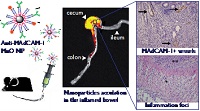
Marta Truffi
University of Milano, Italy
Title: Targeting active bowel inflammation foci by MAdCAM-1-specific nanoparticles
Biography
Biography: Marta Truffi
Abstract
Statement of the Problem: Currently, the evaluation and treatment of inflammatory bowel disease (IBD) commonly relies on aspecific clinical signs of bowel inflammation, while specific targeted devices are still lacking. Mucosal addressin cell-adhesion molecule-1 (MAdCAM-1) has been proposed as a marker of bowel inflammation. It is upregulated on gut endothelium in IBD and is finely related to IBD activity and response to therapy. Here, we investigate a smart nano-platform targeted toward MAdCAM-1 for site-specific nano-theranostics in a preclinical model of IBD.
Methodology & Theoretical Orientation: We coupled anti-MAdCAM-1 antibodies to the surface of manganese oxide nanoparticles, and analyzed nanoconjugate biodistribution and safety in a murine model of IBD, by intravenous injection at the time of early acute phase of the disease.
Findings: Manganese oxide nanoparticles revealed good stability and negligible toxicity toward endothelial cell culture. Twenty-four hours post intravenous administration in colitic mice, fluorescent anti-MAdCAM-1-nanoparticles localized in the inflamed bowel, and specifically accumulated in the proximal part of the colon. By contrast, untargeted nanoparticles were more rapidly washed out. Nanoparticles did not induce histologic lesions in non-target organs.

Conclusion & Significance: Anti-MAdCAM-1-nanoparticles uncovered active bowel inflammation foci, by following the expression pattern of MAdCAM-1 on mucosal vessels. The implementation of this nano-platform for early and specific theranostics applications appears promising for refining clinical care and management of IBD.

